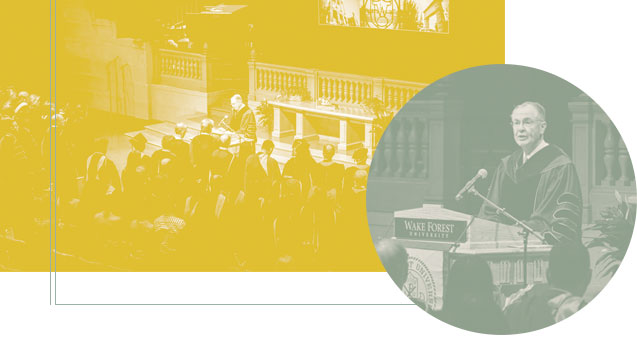An Apology

By Nathan O. Hatch
Historian Jill Lepore once wrote that our history is a gift and a burden. In all of our pasts, we find a mixture of glory and shame, occasions to celebrate and times to mourn. History is the story of real people – flawed and fallible. Because of that, there are parts of our stories – as a nation, as a University and as individuals – that we revere; and there are parts of our stories that are reprehensible. How we address the good and the bad of our past is the foundation upon which we can build our future.
To acknowledge our history, accept responsibility and hold our institution accountable allows us to repair the harm and move toward a better Wake Forest.
As you may know, Wake Forest was founded in eastern North Carolina on the former “Forest of Wake” plantation in 1834. Our founder and all of the antebellum presidents owned enslaved people; many of our trustees were slaveholders; and some of our students perpetuated slavery. Enslaved people helped build and maintain the College. We know that as many as 16 enslaved individuals, given to the College, were sold to benefit the institution financially. Wake Forest University was a full participant in the slave economy.
Our involvement in the institution of slavery is harsh evidence that our realities fell far short of our aspiration. We acquiesced to the times and lacked the moral imagination to envision better for all. Like those who went before us, we can be blinded by our own privilege. We must challenge the logic and end the systems that caused, and continue to cause, significant harm to individuals, our institution and society.
Therefore, it is important and overdue that, on behalf of Wake Forest University, I unequivocally apologize for participating in and benefitting from the institution of slavery. I apologize for the exploitation and use of enslaved people – both those known and unknown – who helped create and build this University through no choice of their own. I apologize that our founders did not recognize and support the humanity and intrinsic value of those they enslaved. And I profoundly regret that subsequent generations of this University did not affirm the humanity of the enslaved individuals who made our existence possible.
As the years pass, each generation has come to comprehend more clearly the injustices that accompanied our founding. With that increased vision and understanding, they have attempted to right that which was wrong. My apology today is not about what you or I did, or did not do, in the past; it is a matter of whether we, as members of this community, are going to take responsibility for the lasting effects of past choices.
There is no perfect moment to acknowledge the past failures of our institution. For some, this apology comes too late; for others, it seems unnecessary. It is necessary. Addressing this part of our story allows us to begin reckoning with the community we were and shape the community we want to be.
There is also no complete solution for how we reconcile with this egregious element of our past. Words alone cannot undo the injustices that were done and the pain that was inflicted, but they can offer a commitment to greater understanding and genuine compassion for those whose experience falls short of our ideals.
Acknowledging past wrongs and taking responsibility is only the start of repairing damage and pursuing healing. A true apology requires taking action and incorporating meaningful change. Many among our campus community have been working to seek and understand a more complete truth of our story. Their findings and forthcoming recommendations will help address past and present inequities and guide future action.
This is a journey we are on together. Today, we acknowledge where our path began. And today, we pledge to one another that we will not forget our history – nor will we let the humanity of any be forgotten – as we move forward. We are committed, together, to live up to our highest ideals, lifting everyone to that standard, as one Wake Forest.
Watch the 2020 Founders’ Day Convocation
‘TO STAND WITH AND FOR HUMANITY’
- Foreward
- Beyond Nostalgia: Towards an Inclusive Pro Humanitate
- An Apology
- From the Forest of Wake to Wake Forest College
- Defending the Indefensible: Wake Forest, Baptists and the Bible
- The Waits, Women and Slavery
- Reflections on the Original Wake Forest College Campus and Cemetery
- Examining Our Past, Enriching Our Future: The Slavery, Race and Memory Project at Wake Forest University
- Lest We Forget
- Selected Bibliography and University Archival Resources
- Contributors

Essays from the Wake Forest University Slavery, Race and Memory Project
Edited by Corey D.B. Walker
